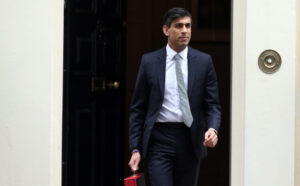
Rishi Sunak is drawing up plans to increase the warm home discount by hundreds of pounds before cutting taxes to help with the cost-of-living crisis.
The chancellor will take a two-pronged approach: a package to help with energy bills in July followed by general tax cuts in the autumn.
From October the warm home discount will give three million of the poorest households in England and Wales £150 off their bills. Treasury officials have drawn up a range of options, including a one-off increase of £300, £500 or even £600 to help households to cope with soaring energy prices.
Inflation is expected to have risen by as much as 9.1 per cent in the year to April, a new record and a significant increase from 7 per cent in March. The Bank of England has forecast that inflation will rise above 10 per cent this year.
The warm home top-up, which could cost more than £1 billion, would be directly funded by the government rather than levied on energy bills as under the present system. The chancellor is said to be attracted to the approach in part because there is less risk of it becoming permanent compared with a significant increase in benefits. Kwasi Kwarteng, the business secretary, has proposed raising the discount to £500.
Sunak will follow the intervention on bills with a budget in the autumn. The Treasury is said to favour reducing income tax by 1p in the pound but other ministers believe that cutting VAT would provide a more significant boost to the economy.
In April the energy price cap, which limits the amount by which bills can increase, rose by 54 per cent from £1,277 to £1,971. It is forecast to rise by a further 40 per cent to £2,800 in October.
The chancellor is coming under mounting pressure from Conservative MPs and cabinet ministers to do more to help people. Yesterday he told the Commons that no “honest chancellor” could promise to reduce the entire impact of global inflation on households.
He made the comments after Andrew Bailey, the governor of the Bank of England, said that Britain was facing “apocalyptic” levels of food price inflation. This has been criticised by several cabinet ministers. The Times has been told that George Eustice, the environment secretary, believes the term apocalyptic is “entirely inappropriate”.
Sunak is also facing pressure from Tory MPs to go further and impose a one-off windfall tax on energy companies. Robert Halfon, chairman of the education committee, and Mel Stride, chairman of the Treasury committee, both supported the move during a Commons debate. Halfon said that oil executives were “the new oligarchs” in reference to record profits recorded by energy companies on the back of soaring wholesale prices.
Sunak said that the government would consider a windfall tax if energy companies did not commit themselves to more investment. He said: “If that doesn’t happen soon and at significant scale then no option is off the table.”
On Wednesday Labour will challenge the Tories via an amendment to the Queen’s Speech to hold an emergency budget addressing the cost of living. Rachel Reeves, the shadow chancellor, will publish analysis claiming that levels of public and private investment in the UK will be 18 per cent of GDP this year, compared with an average of 23 per cent in other G7 countries. This is expected to last until 2027, which Labour says will lead to a £1 trillion “investment gap”.
The Treasury said: “Public sector net investment as a share of GDP is reaching its highest level since the 1970s and the government is investing £600 billion over the next five years to build more roads, railways and hospitals.”
A government said that a decision on the warm home discount would need to be made in the next fortnight because new regulations would need to be laid. It is given to those who claim pensions credit, means-tested benefits and households with average earnings of less than £16,000.
The UK’s unemployment rate has fallen to the lowest level in nearly 50 years. The Office for National Statistics said that the economy had more open job vacancies than unemployed people for the first time since records began, which could further fuel inflation if businesses raise wages to retain staff.
Read more:
Rishi Sunak plans heating bill discounts and tax cuts





